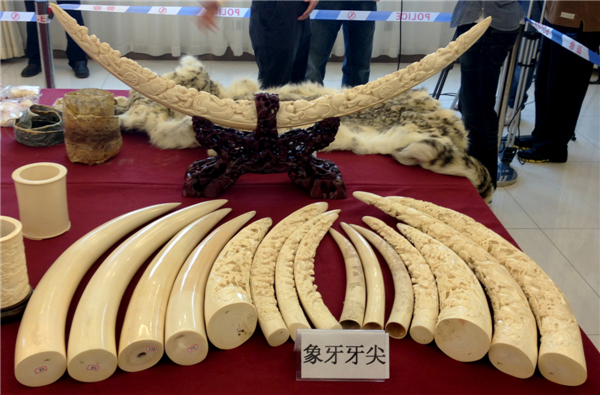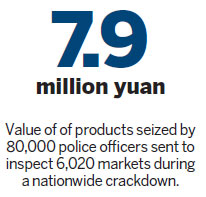Police seize illegally owned and traded animals
Updated: 2013-05-10 07:55
By Zheng Xin (China Daily)
|
||||||||
 |
|
Ivory products seized during a crackdown on the illegal wildlife trade are displayed by the public security office of the Beijing Bureau of Landscape and Forestry on Wednesday in Baiwangshan park. Zheng Xin / China Daily |
Police in Beijing uncovered 14 illegal wildlife trade cases during a crackdown in April, seizing 64 animals and thousands of related products, according to the city's forestry public security office.
The crackdown is meant to better protect the city's wildlife resources and regulate the online environment, as the illegal wildlife trade has become rampant, especially in the artwork market, it said.
Close to 1,000 ivory products weighing more than 200 kilograms and worth more than 8 million yuan ($1.3 million), as well as 64 nationally protected animals are among the seized goods.
In addition to the Chinese capital, cities nationwide are also carrying out a crackdown against the illegal wildlife trade.
According to the State Forestry Administration, police nationwide uncovered 679 cases involving illegal trade of wildlife in April.

About 80,000 police officers were sent to inspect 6,020 markets during the crackdown, seizing products worth at least 7.9 million yuan.
According to Liu Wenshu, a spokeswoman for public security office of the Beijing Municipal Bureau of Landscape and Forestry, the recent illegal trade of wildlife involved more works of art and less feasts on the table.
In addition, most of the suspects are young, which the public security bureau identified as a trend.
Most of the wild animals are kept as pets by owners to satisfy their pursuit of novelty and unique identity, she said.
Liu said the recent cases of illegal wildlife trade are conducted on websites and antique markets with online outlets to provide information.
"Using the Internet for the dissemination of illegal wildlife trade information has turned into a very common crime," she said.
According to Wang Minzhong, director of the Beijing Wildlife Rescue and Rehabilitation Center, the center is keeping all the animals, including boas, chameleons and lorises, and will either send the animals back to their habitats or keep them, depending on their physical condition.
He said the center has helped hatch 37 of 65 boa eggs sent to the rescue station in April.
Wang said despite the growing trend of keeping exotic animals at home, many people are not aware they have seriously violated regulations and are actually harming the protection of the wildlife.
"Many of the exotic animals are very demanding in terms of temperature, humidity, food and other rearing conditions, which makes it challenging and sometimes impossible for the individuals to afford," he said.
According to the city's forestry public security office, cases involving illegal animals or products worth more than 200,000 yuan could see sentences up to 10 years of imprisonment plus fines, while those between 200,000 yuan to 100,000 yuan could see sentences from five to 10 years' imprisonment in addition to fines.
Related readings:
Actress joins campaign against wildlife poaching
Guangzhou wildlife projects unaffected
Using technology to keep a close eye on wildlife
Progress made in fight against wildlife crime
China fights against illicit wildlife trade
China leads successful wildlife crime crackdown
Wildlife protection

 Michelle lays roses at site along Berlin Wall
Michelle lays roses at site along Berlin Wall
 Historic space lecture in Tiangong-1 commences
Historic space lecture in Tiangong-1 commences
 'Sopranos' Star James Gandolfini dead at 51
'Sopranos' Star James Gandolfini dead at 51
 UN: Number of refugees hits 18-year high
UN: Number of refugees hits 18-year high
 Slide: Jet exercises from aircraft carrier
Slide: Jet exercises from aircraft carrier
 Talks establish fishery hotline
Talks establish fishery hotline
 Foreign buyers eye Chinese drones
Foreign buyers eye Chinese drones
 UN chief hails China's peacekeepers
UN chief hails China's peacekeepers
Most Viewed
Editor's Picks

|

|

|

|

|

|
Today's Top News
Shenzhou X astronaut gives lecture today
US told to reassess duties on Chinese paper
Chinese seek greater share of satellite market
Russia rejects Obama's nuke cut proposal
US immigration bill sees Senate breakthrough
Brazilian cities revoke fare hikes
Moody's warns on China's local govt debt
Air quality in major cities drops in May
US Weekly

|

|







